It’s been a year that I don’t think anyone will be forgetting in a hurry. In my 26 years working in education, including my 4 years training, I have never experienced anything like it. As such am hoping my review of 2020 might be something I find myself looking back on at some point in the future. 2020, the year with the pandemic.
The year started of normally with January including the usual BETT event that I briefly attended, plus an EdTech conversations event which I had the privilege to speak at. I must admit I enjoyed the EdTech conversations event in particular, with my visit to BETT a little bit rushed plus, to be honest, I now find BETT to be similar year to year and lacking in any new ideas. Obviously, my journey to London had its usual missteps and calamities as seem to regularly befall me when I travel by train. This almost goes without saying.
In March I found myself in Birmingham speaking at the Digifest event. This was an excellent event with the signs of the pandemic just starting to show in hand sanitising stations and the lack of the usual handshake welcomes at the conference. Will admit my presentation was far from my best however overall, I found the event to be both useful and interesting.This is definitely an event I would like to revisit.
As we approached the half term, in school, we had to accelerate our training and support for staff in relation to using Microsoft Teams as it became likely that schools would be forced to close. Teams had been identified as the key tool in continuing to support learning during lockdown, allowing resources to be shared but also supporting synchronous lessons. Thankfully we had already started using Teams mainly in an administrative capacity for teaching and support departments, so we already had some training resources plus understanding as to how to use Teams. For me personally, it made me glad that I had been pushing for moving to the cloud and to Office 365, as it put us in a position to quickly move to online teaching when the lockdown kicked in. It does make me believe, in education, we need to be braver about our decision making and pursuing what we believe to be the right direction. Too often decisions are overthought and overanalysed to the point that no action, and therefore no progress is made. Yes, education is important, yes we want to avoid making the wrong decisions, but if 2020 has proven anything it has proven we cannot predict the future, so we therefore need to braver and avoid being paralysed or slow to progress, and focussing too much on predicting and planning in minute detail in an unpredictable world. Only then can we provide students with the skills, the knowledge and the character traits needed for the future.
And in late March the lockdown did just that, kicking in, and forcing a move to online teaching and to remote working. It was strange finding myself at home day in day out, working from my PC with the only social contact outside of the family being via Teams video calls. This period highlighted that working from home was possible and even beneficial in some situations, however also highlighted that equally face to face interactions are beneficial and even required in other situations. From a teaching point of view, I still believe face to face is the best way to deliver teaching and learning, however that this can be augmented and supported through the use of technology, online teaching and online learning. Its about finding a balance.
The period from March to August was hard, as we ran with a reduced IT Services department, supporting teachers delivering online teaching largely from their own homes. It was made harder by the lack of the social interaction which would normally occur in our office, where members of the team would support and encourage each other, and occasionally have a laugh. Remote working didn’t quite provide for this and it made everything feel that much more difficult and draining. Additionally, working at home without driving too and from work led to the distinction between being at home or at work, being eroded. This led to work bleeding into home time, and also a difficulty for me in turning off in the evenings and on taking time for myself and for family. Will be honest and say I previously have always struggled with turning it off, however the pandemic and working from home only amplified this issue.
August was meant to see our long-awaited family trip to the US, something we had wanted to do for a large number of years and something we had finally booked to prevent us once again missing out. Sadly, despite booking and making the plan concrete, Covid19 had other ideas and the trip never happened. This was a big disappointment.
September saw the launch of the new academic year and getting students back on site but where there would be occasions where some students would be attending lessons online. This was the birth of the “hybrid” lesson. For me this was also a return to more regular teaching as I took on a couple of year 9 classes in addition to my lower 6 sessions. September as the start of new academic year is often a very busy period but this year it was significantly busier and more challenging.
During September I would receive an unexpected offer in relation to a new job role. It would be weeks and weeks of exploring the options, of stress, of will we or wont we as the opportunity would have once again taken me and my family abroad. The idea of a return to expat life was definitely appealing however the context of a global pandemic was far from ideal. This was one of the most difficult decisions I feel I have had to make in recent years however having considered my family I eventually decided the option in hand was a great option however sadly presented itself at the wrong time. It is interesting, when looking back to my pledges at the start of 2020, I mentioned seeking a new challenge and this would certainly have been it; Sadly this therefore was the right opportunity but clearly at the wrong time.
September also saw me undertake a challenge to complete 100km of running within the month as part of an online group. Must admit am really happy with myself for managing to complete this challenge as it meant running 5 or 6 days within each week. This was way more in terms of health and fitness than I had achieved before so I am very proud to have been able to stick at and complete the target. Sadly, I then let things slip in October and November however I again started to run in December and hope to build up once again into 2021.
October saw me come down with a cough and temperature which instantly got me worried re: covid19. Thankfully the NHS testing service was excellent and I quickly got a test and my results back, indicating a negative; It was a common cold rather than the corona virus. It still took it out of me and led to a couple of days off ill. I suspect the stress of the job offer and the cold/wet mornings running throughout September all played their part in me coming down with a cold and my resultant lack of energy.
As we progressed into November and December I was involved in an esports project to try and launch an interschools competition among independent schools like ours. Its all in its infancy at this point, with a small number of schools planning to partake in the initial pilot however am hoping that after a successful pilot in the spring term it may be possible to grow this project. Esports is something I am passionate about as there are many opportunities out there for our students, plus this area is only going to grow in the coming years.
November also saw the introduction of a puppy to the family. This was another things which had been discussed for many years but for which I was reluctant. With everything that has happened I relented and Ziva joined the family initially a shy puppy before becoming the devil dog she now is.If it can be ripped to shreds, scratched, eaten, chewed, etc, then it has been, and all while maintain a cute, butter would melt in my mouth outward appearance. Am not sure if we are training the dog or she is training us.
Christmas has now came and went and as I am my son have often reflected, it didn’t feel very Christmasy this year. I suspect this is due to the year as a whole lacking some of the normal markers of a year such as a holiday away or the clear distinction between working and being on holiday; Its not very different when your working day involves being at home all day, in the same way as your holidays, with little options available for activities due to lockdown.
2020 for me was meant to be about balance or at least that what I decided when I wrote my pledges back in January. Looking back 2020 has been anything but balanced. Its been crazy, its been frantic and ever changing. Its been some year, a year which looking back seems to have disappeared in a blur, its been the year with a pandemic in it. I suspect things will be different as we move into 2021, with some changes for the better however others less so. This is a year I don’t think I will be forgetting anytime soon.
2020, the one with the pandemic!




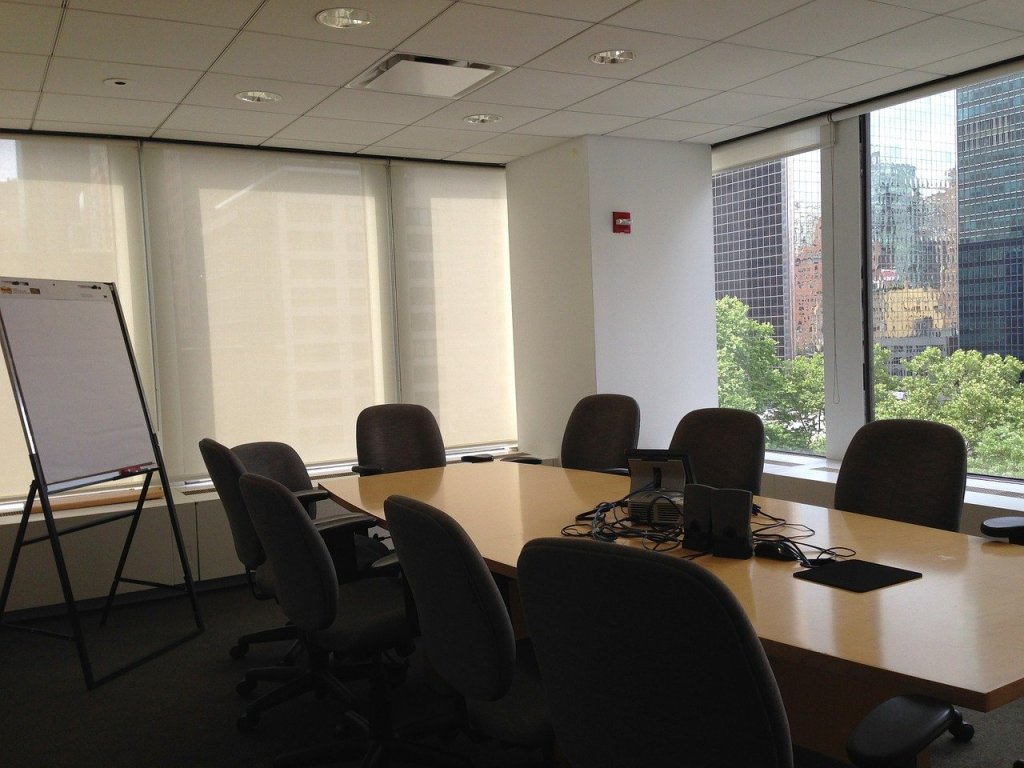
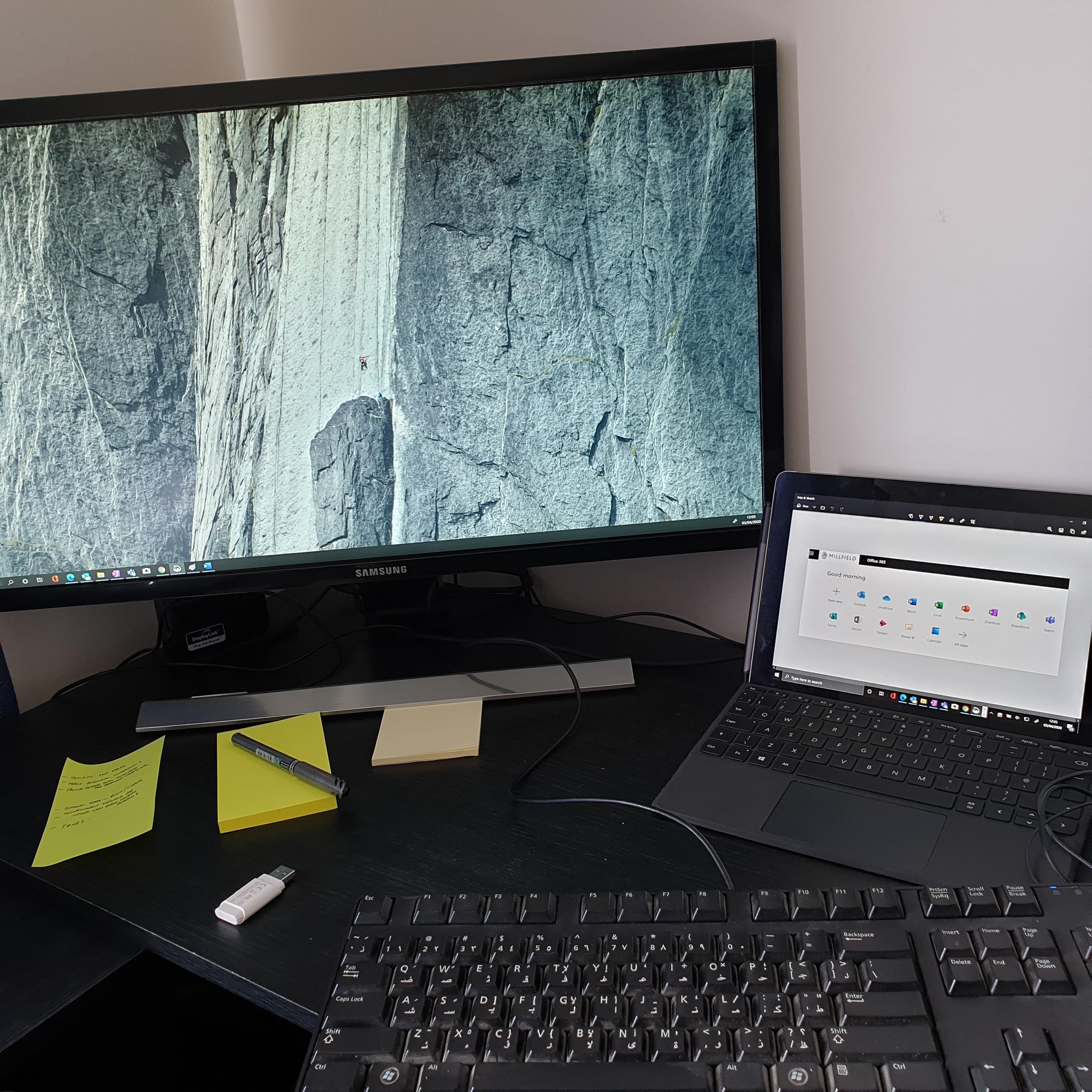 Its now been 2 weeks of working from home so I thought I would share how I am getting on.
Its now been 2 weeks of working from home so I thought I would share how I am getting on. The issue of risk to others is one that particularly interests me and possible the issue which helped me eventually make the correct decision to remain at home. In thinking about this risk, the concept of near-misses and remote-misses in relation to the World War II bombing came to mind. Heading into World War II psychologists were worried about the significant impact on mental health which widespread bombing of London would have. There were fears that society would collapse. The reality was far from this, as people came together and developed a community spirit and resilience, almost the opposite behaviour as to what was expected. As psychologists sought to understand what happened they came upon the concept of near and remote misses. A near miss meant a person physically felt a bomb go off and saw the aftermath in the dead, including friends and relatives. These people suffered psychologically and often physically from bombings. Remote misses referred to those people who heard the bombs fall and saw the damage to building but who did not experience any direct loss or see injuries and deaths first-hand. The vast majority of Londoners fell into the Remote Miss category. For these people, they were spared and may have seen themselves as lucky, and with each subsequent bombing they survived they felt more and more lucky, and even invincible, each subsequent bombing reinforced their belief that bombs didn’t impact on them. It is through these people that the community spirit and resilience built despite all the death and destruction across London during the bombing. Taking this idea and applying it to the Corona virus we have near misses in those who either contracted the virus or have loved ones who have contracted it, and even died from it, but we also have the remote misses in those who haven’t contracted the virus, or had mild symptoms or even who are infected but asymptomatic but who were aware through the news, social media, etc. The remote misses, like in London, significantly outnumber the near misses and through this and the sense of invulnerability or “it won’t happen to me” which may have developed, may have been behaving counter to the guidance being offered by the government. As such “social distancing” wasn’t being adhered to as it wasn’t important, or at least wasn’t perceived to be important. To be clear, the concept of remote misses helps to explain behaviour but it doesn’t excuse it. For me, in understanding behaviour and my own thinking, I was better able to question it and arrive at what I consider the “right” decision.
The issue of risk to others is one that particularly interests me and possible the issue which helped me eventually make the correct decision to remain at home. In thinking about this risk, the concept of near-misses and remote-misses in relation to the World War II bombing came to mind. Heading into World War II psychologists were worried about the significant impact on mental health which widespread bombing of London would have. There were fears that society would collapse. The reality was far from this, as people came together and developed a community spirit and resilience, almost the opposite behaviour as to what was expected. As psychologists sought to understand what happened they came upon the concept of near and remote misses. A near miss meant a person physically felt a bomb go off and saw the aftermath in the dead, including friends and relatives. These people suffered psychologically and often physically from bombings. Remote misses referred to those people who heard the bombs fall and saw the damage to building but who did not experience any direct loss or see injuries and deaths first-hand. The vast majority of Londoners fell into the Remote Miss category. For these people, they were spared and may have seen themselves as lucky, and with each subsequent bombing they survived they felt more and more lucky, and even invincible, each subsequent bombing reinforced their belief that bombs didn’t impact on them. It is through these people that the community spirit and resilience built despite all the death and destruction across London during the bombing. Taking this idea and applying it to the Corona virus we have near misses in those who either contracted the virus or have loved ones who have contracted it, and even died from it, but we also have the remote misses in those who haven’t contracted the virus, or had mild symptoms or even who are infected but asymptomatic but who were aware through the news, social media, etc. The remote misses, like in London, significantly outnumber the near misses and through this and the sense of invulnerability or “it won’t happen to me” which may have developed, may have been behaving counter to the guidance being offered by the government. As such “social distancing” wasn’t being adhered to as it wasn’t important, or at least wasn’t perceived to be important. To be clear, the concept of remote misses helps to explain behaviour but it doesn’t excuse it. For me, in understanding behaviour and my own thinking, I was better able to question it and arrive at what I consider the “right” decision.



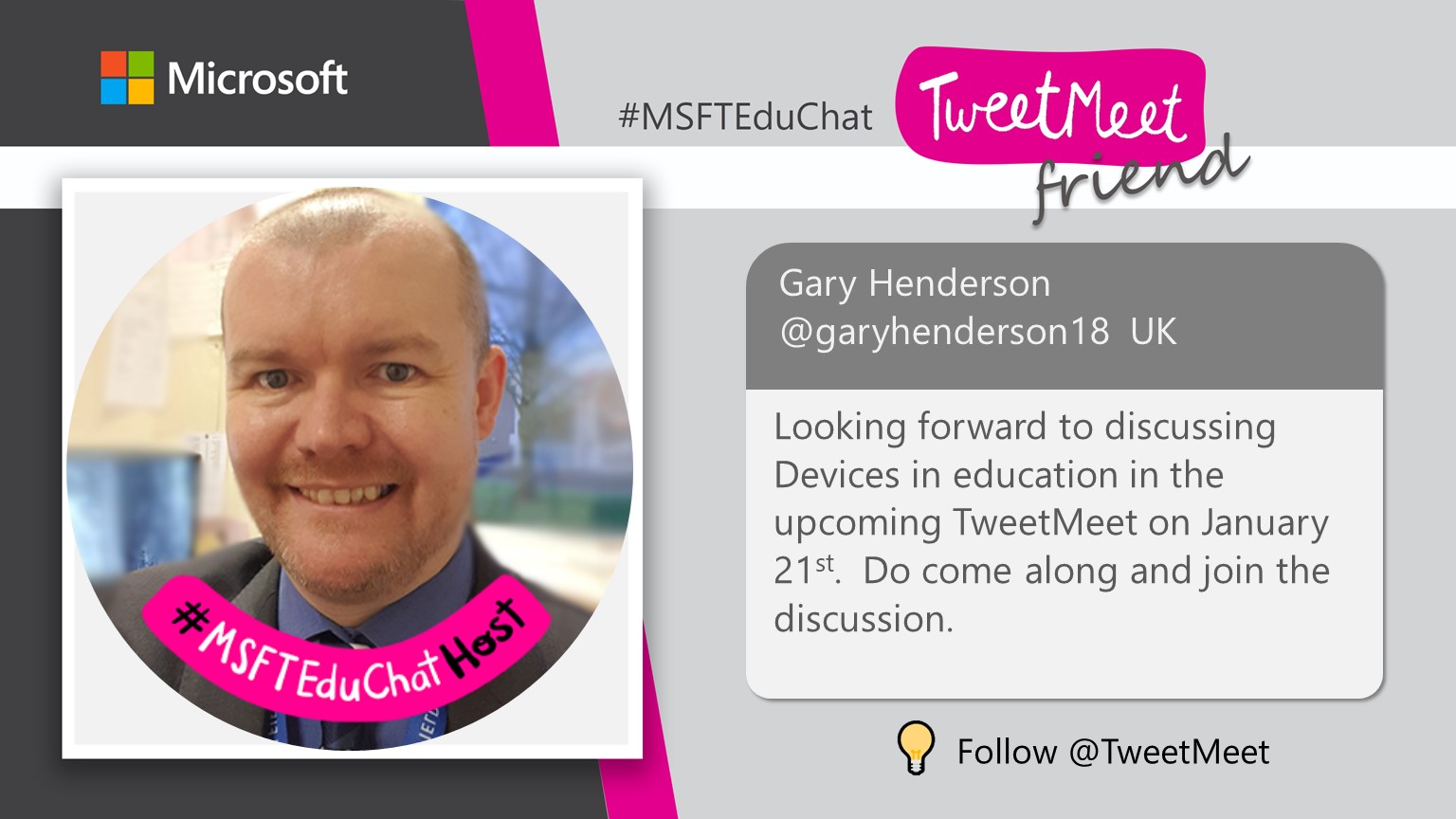 On the 21st Jan I did my first Microsoft TweetMeet as one of the hosts. I have been involved in previous TweetMeets as a participant and have also hosted a couple of non-Microsoft TweetMeet, however as I posted previously (read
On the 21st Jan I did my first Microsoft TweetMeet as one of the hosts. I have been involved in previous TweetMeets as a participant and have also hosted a couple of non-Microsoft TweetMeet, however as I posted previously (read 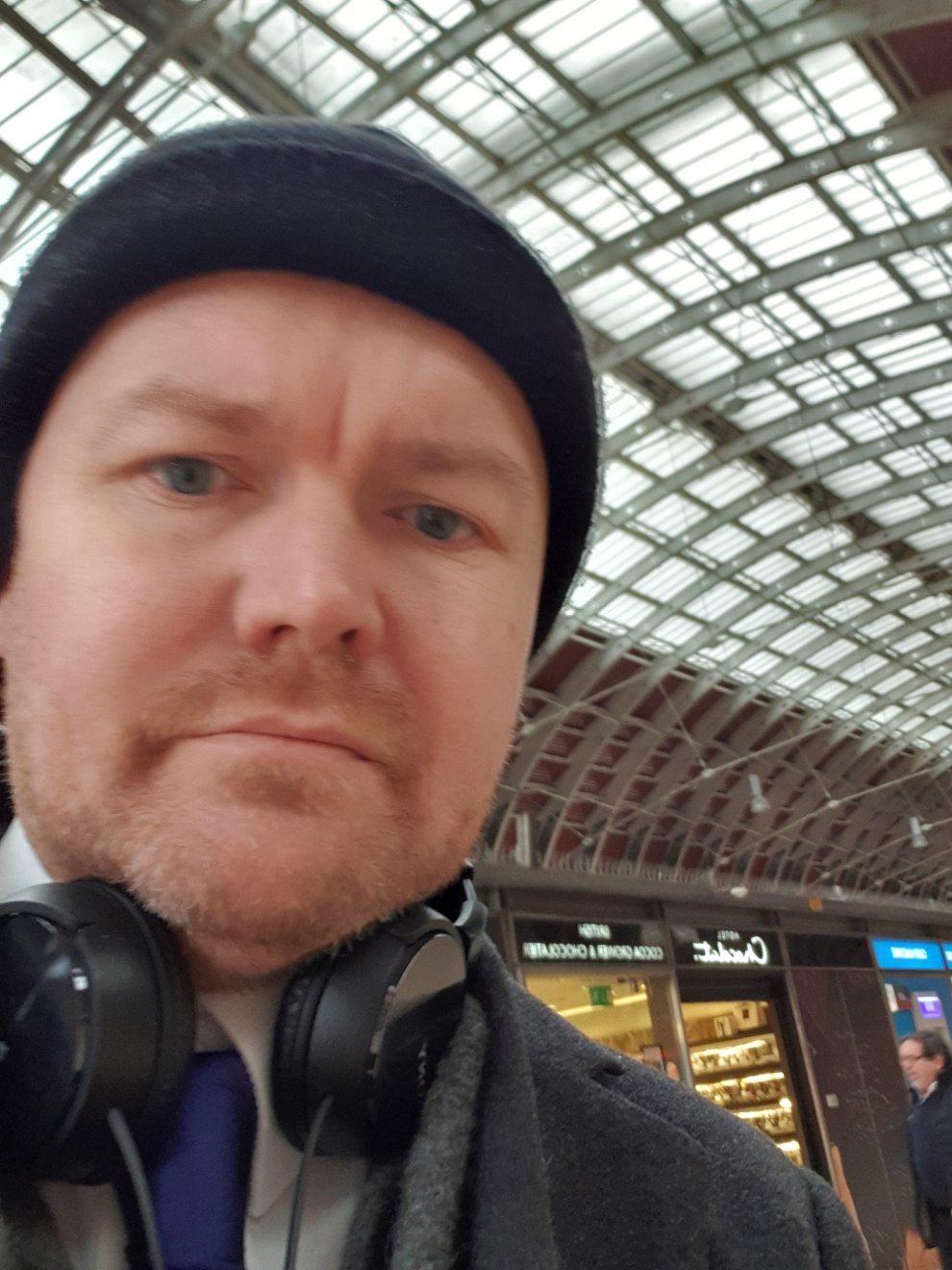 Another year another BETT and guess what? Once again, I failed to learn from experience and decided to make my way down via train and once again it went wrong. This time it was simply my first train being late leading to me missing my connecting train. This had the same concertina impact as I experienced last year leading to me rushing around. Maybe next year I will learn? Third time lucky?
Another year another BETT and guess what? Once again, I failed to learn from experience and decided to make my way down via train and once again it went wrong. This time it was simply my first train being late leading to me missing my connecting train. This had the same concertina impact as I experienced last year leading to me rushing around. Maybe next year I will learn? Third time lucky?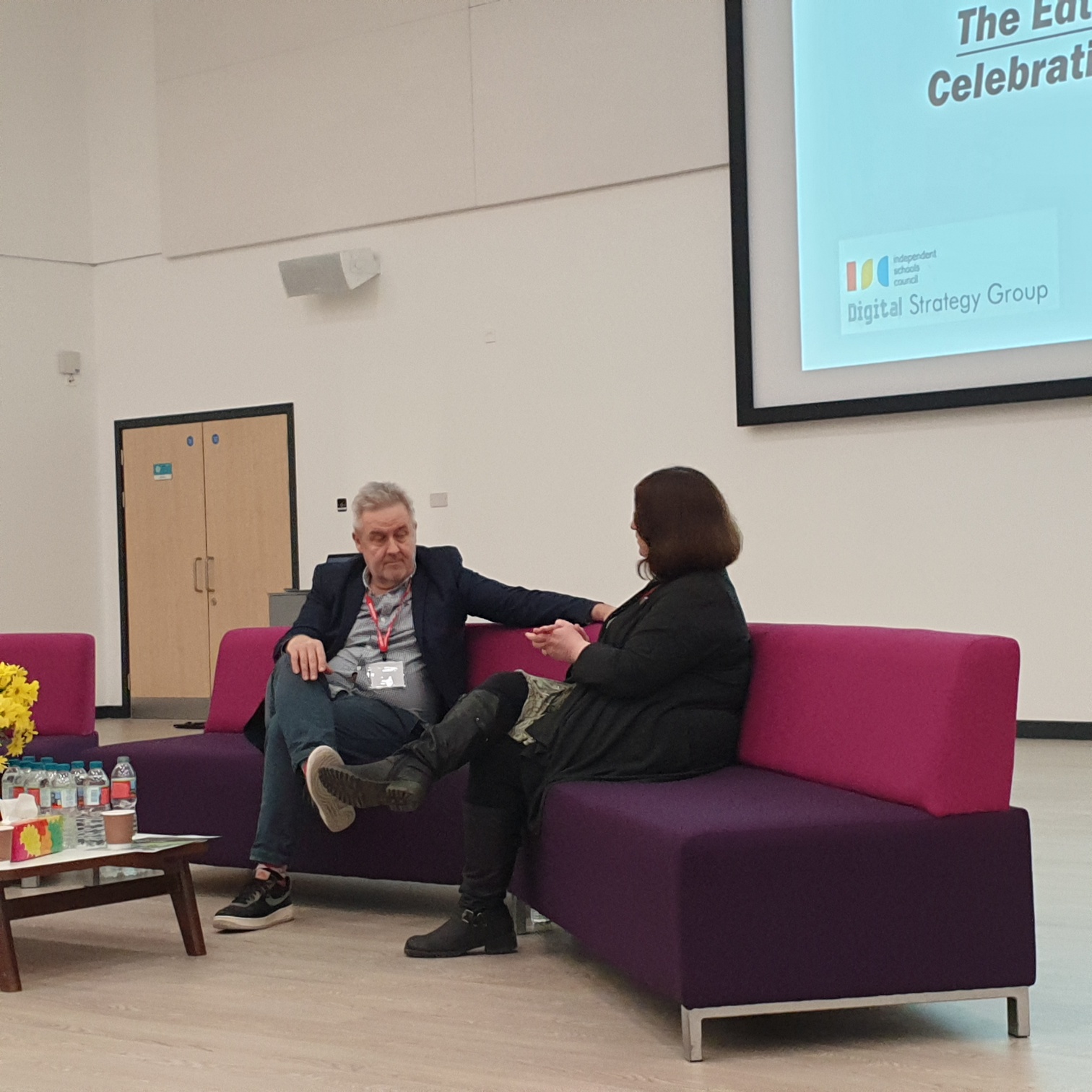 In terms of the other speakers, who presented in a more professional and polished manner than myself, I found Emma Darcy and her discussion with Ty very interesting discussing. I particularly liked her mention of preparing students for “jobs of the future” which fits with my views in the needs to do more in relation to digital citizenship.
In terms of the other speakers, who presented in a more professional and polished manner than myself, I found Emma Darcy and her discussion with Ty very interesting discussing. I particularly liked her mention of preparing students for “jobs of the future” which fits with my views in the needs to do more in relation to digital citizenship.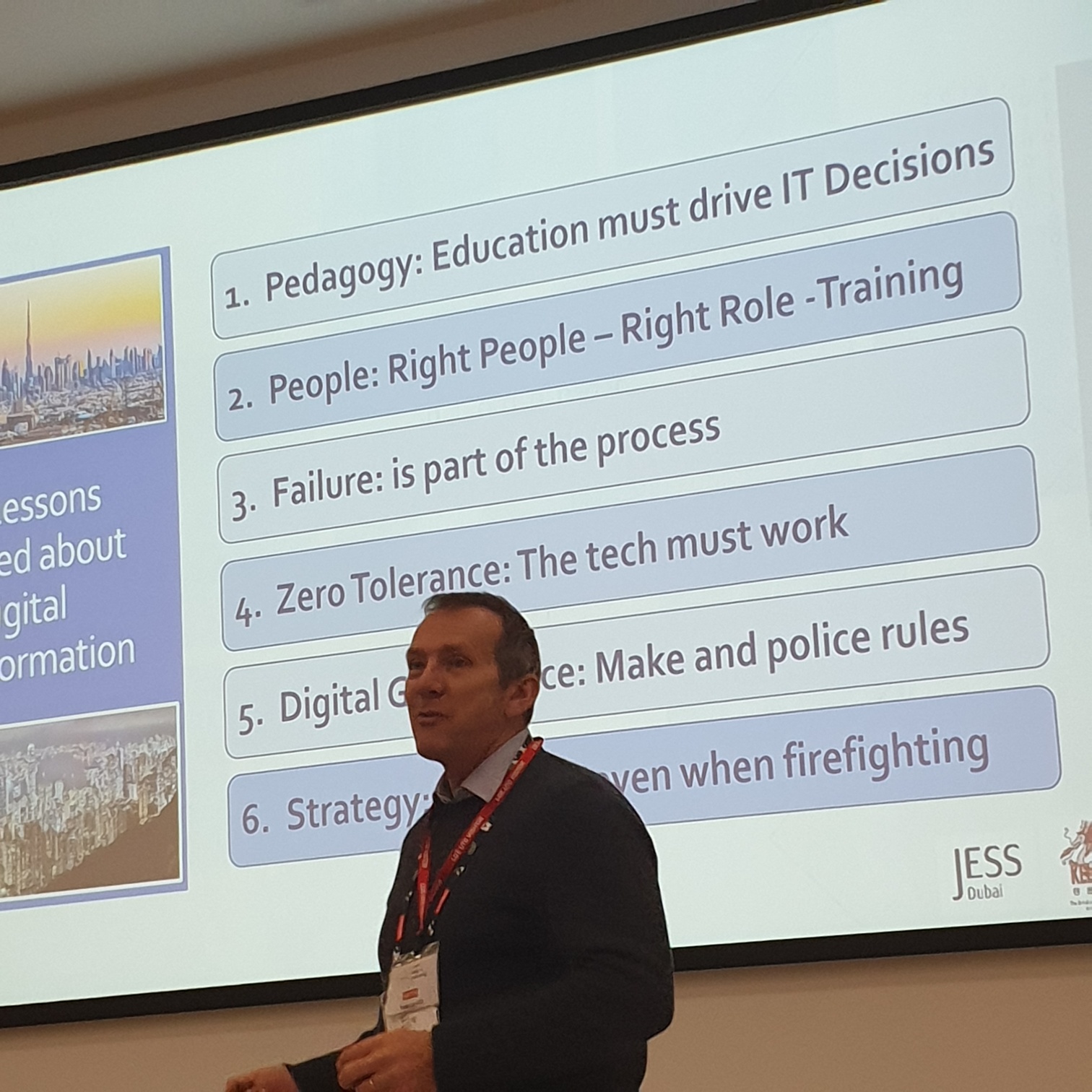 Also, another highlight was Mark Steed. Now I have heard mark speak on a number of occasions, but his 6 lessons were particularly interesting. Like Laura Knight he mentioned the need to focus on people, adding to this regarding a focus on training. He also highlighted that although his strategy appears to have been very successful it wasn’t without errors. I think this is an important message in that in reviewing others strategies and approaches it almost always looks like a straight line; they were here then did X and Y and got to there. The reality thought is that there would likely have been lots of wrong turns, mistakes, problems so its more like they did A, B, C, D, E and A and B didn’t work, C had to be adjusted and became F, and eventually they got to X and Y and success. I think this is what I was trying to get across with my journey idiom however I don’t think I was successful in this.
Also, another highlight was Mark Steed. Now I have heard mark speak on a number of occasions, but his 6 lessons were particularly interesting. Like Laura Knight he mentioned the need to focus on people, adding to this regarding a focus on training. He also highlighted that although his strategy appears to have been very successful it wasn’t without errors. I think this is an important message in that in reviewing others strategies and approaches it almost always looks like a straight line; they were here then did X and Y and got to there. The reality thought is that there would likely have been lots of wrong turns, mistakes, problems so its more like they did A, B, C, D, E and A and B didn’t work, C had to be adjusted and became F, and eventually they got to X and Y and success. I think this is what I was trying to get across with my journey idiom however I don’t think I was successful in this. As to BETT, after all my rushing around I only ended up with a couple of hours in BETT so can only offer a rather superficial view. Sadly, this view is that the event generally seemed very much the same as it has in every year I have attended since returning to the UK. If you had a specific stand or vendor to see, then it would be useful but if you are seeking to browse or to find innovative ideas then I think you would have been disappointed. This at least was my initial view on reflecting having returned home. A few days have passed this then I have reflected a bit more and I can see how BETT can be seen as very worthwhile now. It isn’t in the EdTech conference which the event is, or in the stands of technology vendors. The strength in BETT lies in the fact the event draws educators and EdTech leaders from across the country and across the world together for 4 days and in the networking this brings. On hindsight, even in my brief visit, I ended up at one stand where I had conversations with a number of EdTech leaders and as a result came away with plans to connect further and explore ideas and also issues and problems. But from this comes a question: Can we stimulate the same networking opportunities without the massive cost to vendors to be present at an event like BETT? A cost they ultimately pass on to their customers; schools.
As to BETT, after all my rushing around I only ended up with a couple of hours in BETT so can only offer a rather superficial view. Sadly, this view is that the event generally seemed very much the same as it has in every year I have attended since returning to the UK. If you had a specific stand or vendor to see, then it would be useful but if you are seeking to browse or to find innovative ideas then I think you would have been disappointed. This at least was my initial view on reflecting having returned home. A few days have passed this then I have reflected a bit more and I can see how BETT can be seen as very worthwhile now. It isn’t in the EdTech conference which the event is, or in the stands of technology vendors. The strength in BETT lies in the fact the event draws educators and EdTech leaders from across the country and across the world together for 4 days and in the networking this brings. On hindsight, even in my brief visit, I ended up at one stand where I had conversations with a number of EdTech leaders and as a result came away with plans to connect further and explore ideas and also issues and problems. But from this comes a question: Can we stimulate the same networking opportunities without the massive cost to vendors to be present at an event like BETT? A cost they ultimately pass on to their customers; schools. It’s that time again to make some pledges for the year ahead. I think it is important to document this to give the older me, in a years’ time, something to look back on. I have long accepted that memory is far from accurate and therefore there is a need to keep a record.
It’s that time again to make some pledges for the year ahead. I think it is important to document this to give the older me, in a years’ time, something to look back on. I have long accepted that memory is far from accurate and therefore there is a need to keep a record.